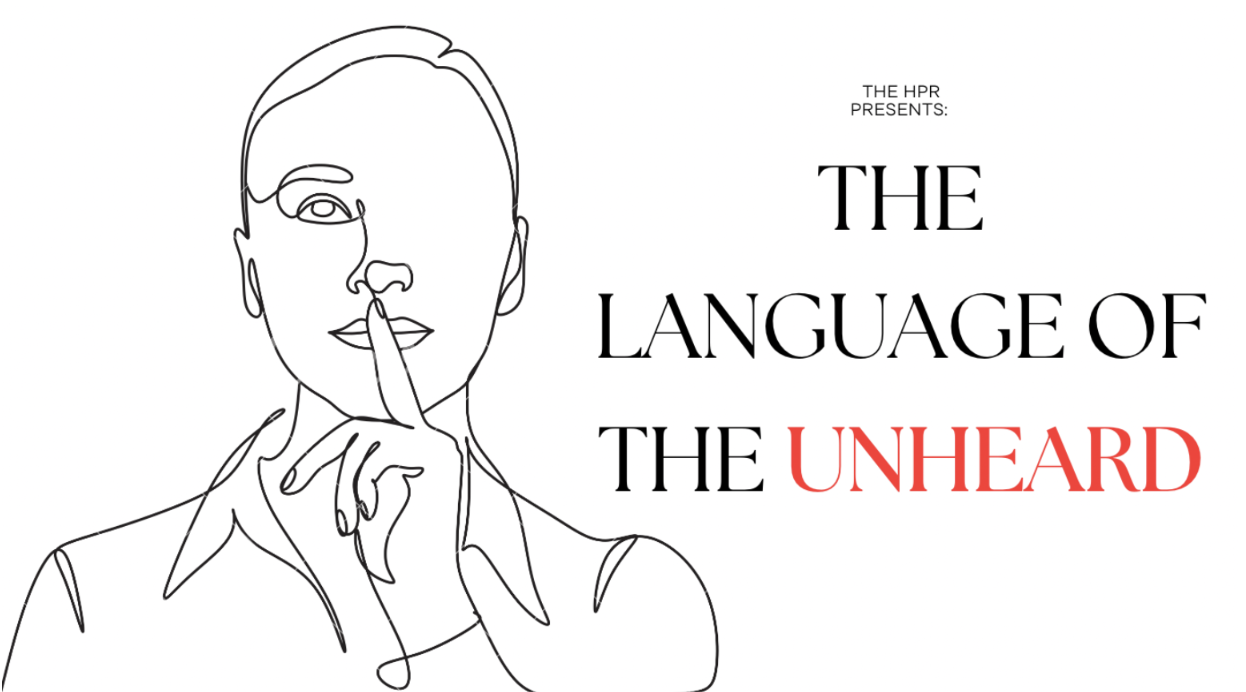The voices we hear in politics are often from those who have the privilege to speak in the first place — college students speaking out against discrimination, protest organizers with time to lead an effort. While these initiatives amass media attention, it’s easy to forget the voices we do not hear. From redlining to abuse to genocide, millions all over the world face injustices that deserve an uproar, yet have no microphone, no podium, no way to speak these injustices to the public ear. Whether deprived of necessary resources or scared into silence, those affected by salient oppression largely go unheard — marginalized to a nameless statistic or a faceless story.
The Language of the Unheard was pitched by Associate Managing Editor Sophia Scott ’25. “Too often, journalists tell stories of injustice and inequity from an outside perspective, which deprives the public of valuable insight into how targeted populations have resisted oppression and mistreatment,” Scott wrote. She asserted that “focusing on the language of the unheard provides a rare chance for the HPR to spotlight marginalized voices and bring them to the forefront of the conversation.” Through this iteration of our quarterly magazine, our creators seek to answer an often unasked question: What has our world failed to hear?
Learn more about the creators who contributed to this cycle below.

Kareem King: “Gentrification and Displacement in Jamaica Plain: City Corruption and Tenant Neglect”
House/Dorm Affiliation: Lowell House
Concentration/Intended Concentration: History of Science
Area of Interest in Politics/Journalism: My interests in journalism lie at the intersection of social justice, health equity, and community-level activism. My goal is to bring attention to local issues that affect marginalized peoples and critically reflect upon the sociopolitical frameworks which allow them to persist.
A quote I wish more people knew: “We complain about the dirt with the broom in our hands.” — Mel King

Emily Willrich: “Intervention in Iran: A Historical Take on the U.S.’ Response to Recent Protests”
House/Dorm Affiliation: Dunster House
Concentration/Intended Concentration: History
Area of Interest in Politics/Journalism: International Relations
A quote I wish more people knew: “The stars we are given. The constellations we make.” — Rebecca Solnit

Sazi Bongwe: Interview with Vijay Prashad
House/Dorm Affiliation: Wigglesworth Hall
Concentration/Intended Concentration: Social Studies
Area of Interest in Politics/Journalism: South African politics, politics of the African continent and the Global South, decolonial politics, emancipatory politics / long form, slow journalism, literary criticism, cultural criticism
A quote I wish more people knew:
“Utopia lies at the horizon.
— Eduardo Galeano
When I draw nearer by two steps,
it retreats two steps.
If I proceed ten steps forward, it
swiftly slips ten steps ahead.
No matter how far I go, I can never reach it.
What, then, is the purpose of utopia?
It is to cause us to advance.”

Rhys Moon: “A Tale of Resistance: Queer Resilience Around the World”
House/Dorm Affiliation: Matthews Hall
Concentration/Intended Concentration: Applied Mathematics & Government
Area of Interest in Politics/Journalism: International relations, comparative politics, cultural criticism, identity politics A quote I wish more people knew: “I imagine, therefore I belong and am free.” — Emily Dickinson

Emma de Jong: “Omissions in History”
House/Dorm Affiliation: Canaday-B
Concentration/Intended Concentration: History and Economics / Social Studies
Areas of Interest in Politics/Journalism: Disinformation, Universal Suffrage, Hong Kong-China-Taiwan relations, Abortion Rights, Capital Punishment, the Russo-Ukrainian War, Domestic Terrorism, and Rising Fascism.
A quote I wish more people knew: “I know but one freedom and that is the freedom of the mind.” — Antoine de Saint-Exupéry

Mihaela Esanu: “Voices of the Deported: Forcible Soviet Transfers”
House/Dorm Affiliation: Dunster House
Concentration/Intended Concentration: Government
Area of interest in politics/journalism: European politics
A quote I wish more people knew: “Whatever is yours is set aside for you.” — Romanian proverb
The intro note to “The Language of the Unheard” was written by Covers editors Liana McGhee ’25 and Nurayn Khan ’26.



